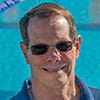How Triathletes Should Spend Their Offseason
Have fun learning to love the swim
Many triathletes don’t start serious swim training until springtime. I get it; if you’re uncomfortable swimming or if it isn’t your best sport, it’s only natural to postpone swimming hard until you really have to.
But because swimming is such a technical sport, it’s a mistake to avoid the water entirely during your off season. You don’t have to get stressed about it; just get in the water at least once a week to relax and enjoy learning about your body’s relationship with the water.
Here are some fun, pressure-free suggestions for maintaining (or improving) your swim skills during your workout hiatus.
Think
The first step is to take an honest inventory of your swimming skills. Yes, swimming does require specific strength and fitness training that can’t be precisely duplicated on dry land, but that training will come when you start practicing with a Masters club as the race season approaches. For this discussion, though, let’s talk about skills you can hone on your own without a structured workout.
- Breathing—Is your head motion smooth, in line with your spine, and in sync with a comfortable inhale/exhale breathing pattern? As you focus on your breathing, don’t worry about how far or fast you swim, just find a sustainable rhythm with a tranquil motion that allows you to stay level in the water.
- Alignment—Think about how long and straight your body can be. As you extend your hand forward for your catch, keep that hand directly in front of your shoulder while making sure your spine doesn’t curve toward the opposite side. If you can get a lane to yourself, keep the lane stripe directly beneath you and make corrections if you see any lateral movement off that line.
- Efficiency—Recognize that time spent fine-tuning your technique is an investment in the energy you’ll have available during the bike and run. Count your strokes each length to get the maximum movement for each stroke cycle.
As you focus on these techniques, forget about effort, intervals, and exhaustion. Take breaks when you need them, laugh when you make a mistake, and relish the confidence boost you receive from the knowledge gained.
Feel
Thinking about technique is effective only when you make the correct adjustments. Unfortunately, it’s impossible to visually monitor your entire body as you swim, so unless you have a coach watching or can record yourself on video, you need to engage your other senses to give yourself factual feedback.
- Head—Feel the water line on top of your head, and make sure it stays there as you rotate to breathe. (If you feel the waterline crossing your eyebrows, you’ve come up too high.) Check to verify that one goggle stays in the water when you inhale.
- Hands—Focus on your sense of touch to verify that your hands are cutting in cleanly (no slapping against the surface) and not waving around or crossing in front of your face. If you feel pressure against the back of your hand or pushing to the side, change your motion so that the force is always against your palm, pushing toward your feet to propel you forward.
- Ears—If your lower ear feels air when you breathe, you’ve lifted your head, which results in a distorted body position and dropped hips. Also, listen for splashing and thumping, which indicate that your hands or feet have created turbulence, decreasing propulsion.
- Feet—Develop the habit of sensing the position of your feet. If they drop below the depth of your torso or splay out to the side, restore your balance and alignment with proper arm extension and head position.
Your body is floating, so any misalignment at one end creates an equal and opposite skew at the other end. Train yourself to constantly monitor your nonvisual senses so you can notice and fix mistakes.
Play
The greatest benefit you can achieve in the offseason is to learn to love swimming enough to transform it into a joy you’ll savor throughout the entire year. So, whenever you’re in the pool, have fun!
- Games—Water polo, underwater hockey, and even tossing a ball around with friends will help you develop skills that pay off in racing.
- Diving wells and hot tubs—Treading water, sculling on your back, and vertical kicking are all great ways to enjoy yourself while enhancing your relationship with the water. Experiment with different kicking techniques, hand shapes (spreading your fingers), and arm motions to enhance your understanding of hydromechanics.
Give yourself permission to goof around in the pool. Even if you have dreaded swimming in the past, let yourself enjoy getting wet and moving around in the pool without putting any pressure on yourself. If you pay attention to how the water responds to you, you’ll make progress that will pay off when you get back to competition.
Categories:
- Technique and Training
SIGN UP FOR UPDATES FROM USMS
















